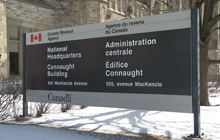Case Commentary: How the CRA abused the voluntary disclosure process for this Canadian taxpayer

The Canada Revenue Agency proposed to reassess the Milgram Foundation after accepting its voluntary disclosure application thus prompting a judicial review
Introduction
A notable victory for the taxpayer against the CRA's VDP abuse
 |
David J Rotfleisch, CPA, JD is the founding tax lawyer of Taxpage.com and Rotfleisch & Samulovitch P.C., a Toronto-based boutique tax law corporate law firm. |
In September 2024, the Federal Court delivered a notable victory for the taxpayer in Milgram Foundation v. Attorney General of Canada and Minister of National Revenue, 2024 FC 1405. The Federal Court declared that the decision by the Canada Revenue Agency to reassess the taxpayer after the CRA had already accepted the voluntary disclosure application filed by the taxpayer, an abuse of process. The decision, therefore, was quashed, and the CRA was ordered to "consider the Court's declaration and to take necessary actions to give effect to the reconsidered decision."
Background
Milgram Foundation filed a voluntary disclosure application that was accepted
Milgram Foundation was established in 1964 in Liechtenstein and did not file tax returns in Canada before 2015. After considering it might be deemed a Canadian tax resident, Milgram submitted an application under the Voluntary Disclosure Program to the CRA for the 2003-2014 taxation years. In the application, Milgram disclosed that it was established in 1964.
The CRA accepted Milgram's application and proceeded to issue notices of assessment for the 2003-2014 taxation years in 2016. Then, in 2018, the CRA, in a proposal letter to Milgram, informed that upon further review, it had discovered a misrepresentation that amounted to "neglect, careless or wilful default" on the part of the taxpayer and thus proposed to reassess Milgram for the 1998-2002 taxation years (recall that the concerning taxation years in the Voluntary Disclosure application were 2003-2014).
The CRA also said in the letter that the proposal would "correct the fiscal situation of [Milgram] from its creation to December 31, 2014." Milgram applied to the Federal Court for a judicial review.
The proposal to reassess can be a reviewable matter
A major point of contention in this case is whether a proposal to reassess is a decision or matter subject to judicial review. The CRA argued that a proposal is not a final decision. It only informs the taxpayers of the intention of the Minister to reassess and invites the taxpayers to respond. The CRA relied on Prince v Canada (National Revenue), 2020 FCA 32 (Prince), where the CRA's proposal to reassess was held not to be a reviewable decision.
The Federal Court distinguished the case at bar with Prince. In Prince, the CRA had already initiated an audit of the taxpayer and hence rejected the taxpayer's Voluntary Disclosure application. The Federal Court's decision to dismiss the taxpayer's judicial review application was, therefore, reasonable and did not need to be reviewed.
On the contrary, in this case, the CRA accepted Milgram's voluntary disclosure application as voluntary and complete and then reversed and proposed to reassess. The CRA's conduct in reviewing the taxpayer's Voluntary Disclosure application was troubling and thus needed to be examined.
Judicial review is not a collateral attack on tax assessment jurisdiction
The CRA also argued that, by bringing the judicial review application to the Federal Court, the taxpayer was launching a "collateral attack" on the legal validity of tax assessments, over which the Tax Court of Canada (TCC) has exclusive jurisdiction.
The Federal Court dismissed this argument, saying that the CRA mischaracterized the essence of Milgram's judicial review application. The application was not to ask for a judgment on tax assessments. The underlying process, the voluntary disclosure application, does not affect tax liability, and is only to request relief in respect of interests and penalties.
Rather, the application was to ask for a review of the fairness of the CRA's conduct in the process, a matter of administrative law principle over which the Federal Court clearly has jurisdiction.
The CRA's conduct is an abuse of process
The Federal Court found the CRA's conduct in proposing a reassessment of Milgram's prior year returns an abuse of the voluntary disclosure process.
The CRA already accepted Milgram's application as voluntary and complete. The CRA carried out a review and audit of the taxpayer, finding no errors, before accusing the taxpayer of misrepresentation as a pretext for reassessment. The CRA's allegation of misrepresentation relied on the fact that Milgram was established in 1964 (whereas the application was for the 2003-2014 taxation years), information that was provided voluntarily by Milgram in its application and was accepted as complete by the CRA.
Furthermore, in the letter, the CRA said the proposal to reassess Milgram for the 1998-2002 taxation years would correct Milgram's fiscal situation from its creation (in 1964). When asked about the timeline discrepancy, the CRA said it could re-open the matter and issue further assessments in the future. This position, according to the Federal Court, reinforces the arbitrariness of the CRA's approach and the lack of finality in the process.
Finally, the Federal Court quashed the CRA's proposal to reassess, granted Milgram declaratory relief because the CRA's conduct was unreasonable, and required the CRA to reconsider its decision.
This case demonstrates the power of the Federal Court and the scope of judicial review. When it comes to tax, Tax Court is not the only venue. While the Federal Court cannot invalidate or make a judgment on tax assessments, it can, however, sometimes review the decision of the CRA in the assessment process.
David J Rotfleisch, CPA, JD is the founding tax lawyer of Taxpage.com and Rotfleisch & Samulovitch P.C., a Toronto-based boutique tax law corporate law firm and is a Certified Specialist in Taxation Law who has completed the CICA in-depth tax planning course. He appears regularly in print, radio and TV and blogs extensively.
With over 30 years of experience as both a lawyer and chartered professional accountant, he has helped start-up businesses, cryptocurrency traders, resident and non-resident business owners and corporations with their tax planning, with will and estate planning, voluntary disclosures and tax dispute resolution including tax audit representation and tax litigation. Visit www.Taxpage.com and email David at david@taxpage.com.
Read the original article in full on Mondaq. Author photo courtesy Rotfleisch & Samulovitch P.C. Title iamge: iStock ID:155392441.








(0) Comments